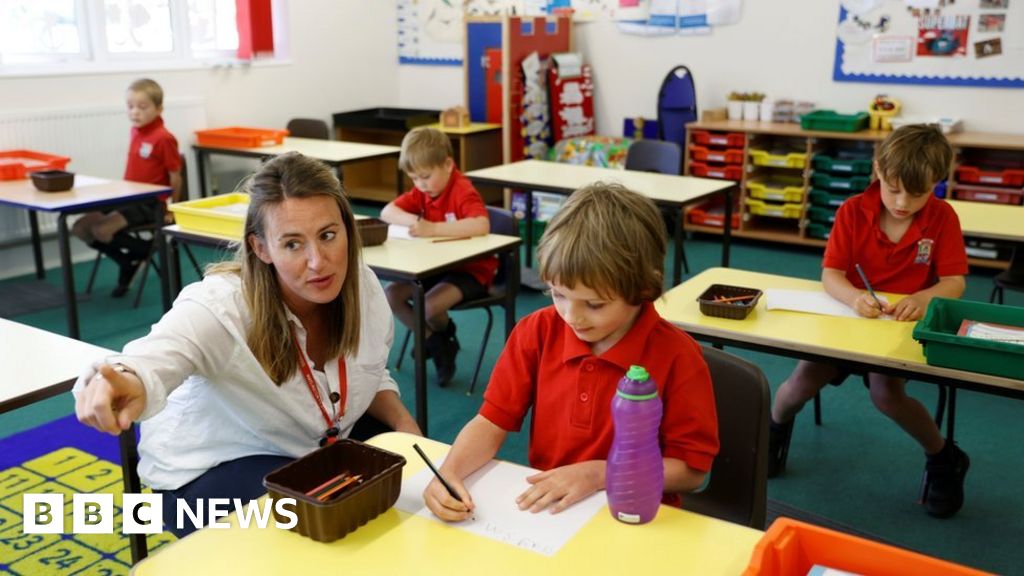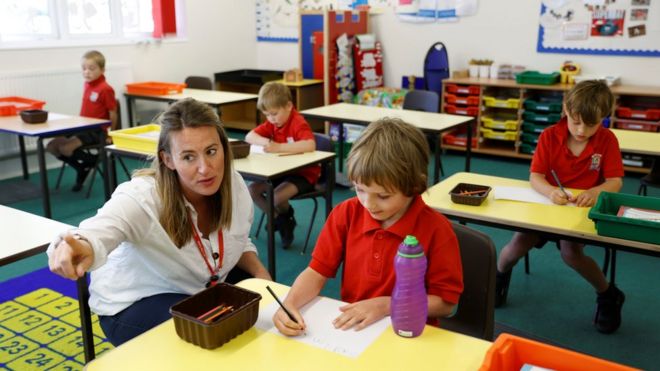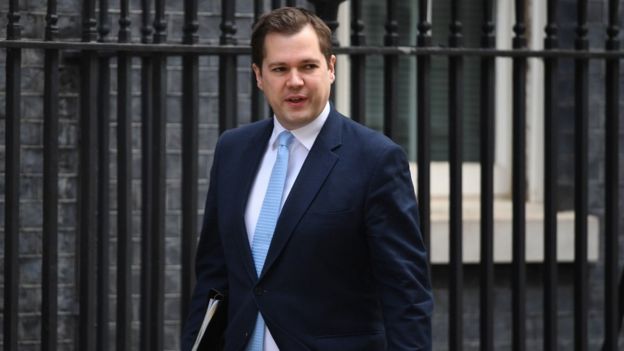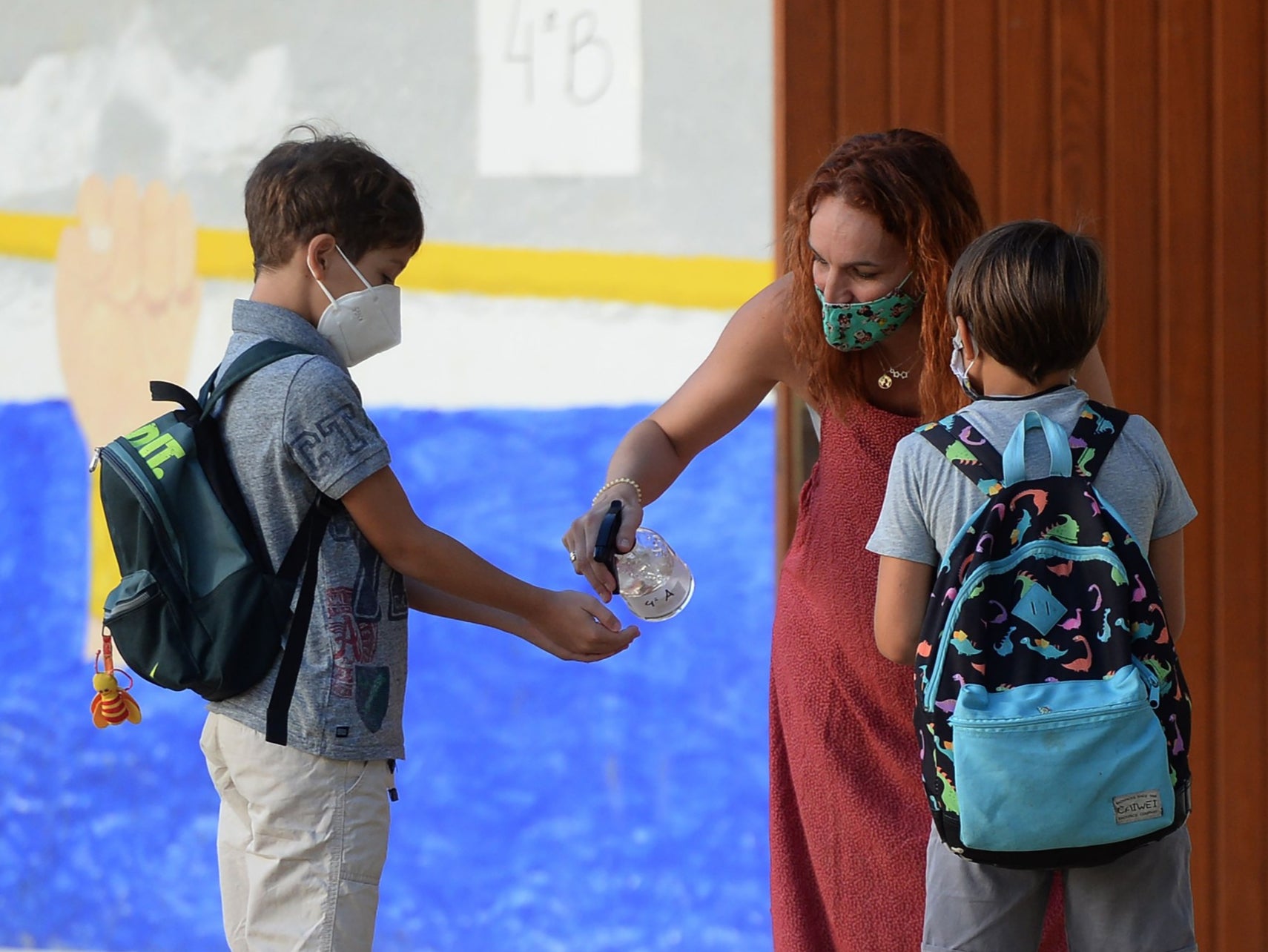CORONAVIRUS
The Michigan Supreme Court Is Reviewing the Case of a Teenager Incarcerated After Not Doing Online Schoolwork During the Pandemic
Attorneys for a 15-year-old sent to juvenile detention for not doing her schoolwork argued the teenager is not a threat to the community, contrary to a judge’s ruling. Now Michigan’s Supreme Court is stepping in.
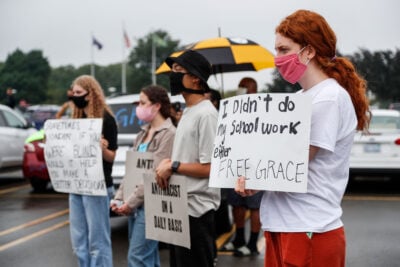
Protesters at the #FreeGrace rally and car caravan on Thursday
in Pontiac, Michigan. (Junfu Han/Detroit Free Press)
by Jodi S. Cohen,
ProPublica, and
Nisa Khan,
Detroit Free Press
July 16, 2020
The Michigan Supreme Court said Thursday it is reviewing the circumstances of a case involving a 15-year-old girl who has been in detention since mid-May after a judge determined she violated her probation by not doing her online schoolwork during the pandemic.
That news came the same day attorneys for the teenager filed a motion in court seeking an emergency review and reconsideration of her case and more than 200 people formed a car caravan to protest on her behalf outside the Oakland County Courthouse.
In a statement, the state Supreme Court’s communications director, John Nevin, said, “The State Court Administrative Office is working with the Oakland Circuit Court to examine the processes in this case.”
The case, which has drawn national scrutiny, was detailed in a ProPublica Illinois investigation co-published Tuesday with the Detroit Free Press and Bridge Magazine.
The girl, Grace*, was a high school sophomore in Birmingham Public Schools when she was charged with assault and theft last year. She was placed on probation in mid-April and, among other requirements, was to complete her schoolwork. Grace, who has ADHD and receives special education services, struggled with the transition to online learning and fell behind.
Oakland County Judge Mary Ellen Brennan, the presiding judge of the Family Division, found Grace had violated probation by not completing her schoolwork and ordered her to detention. She concluded Grace was a “threat to (the) community” based on the prior charges of assault and theft.
Grace was detained beginning May 14, when the state was operating under an order from Gov. Gretchen Whitmer to eliminate any form of detention or residential placement unless a young person posed a “substantial and immediate safety risk to others.”
In the court filing Thursday, one of Grace’s attorneys, Jonathan Biernat, wrote that the decision to detain the teenager was contrary to that order because she was “detained based on incomplete schoolwork, which hardly presents a risk of harm to either the community,” or herself.
“The record is entirely devoid of facts to support the actual threat of harm presented by (Grace),” Biernat wrote in the motion.
The motion states that Grace has had “no issues” during the more than two months she has been at the Children’s Village detention center in suburban Detroit, first in secure detention for three weeks and then in a residential treatment program. She “has been an exemplary participant and has completed any and all tasks assigned to her in the time allowed.”
In a statement, the Oakland County court’s Family Division pushed back on criticism of Brennan, saying judges base their decisions on an “extensive review” of information, including public and non-public documents. The court said Grace’s assault and theft charges were “two of many factors” leading to her placement at Children’s Village.
“By definition, any public report is incomplete, out of context, and unfair to all concerned,” according to the statement. “Family court judges have one criterion that must be followed — to make decisions that are in the best interest of the child and the family. This decision is not influenced by race, by income, by ethnicity, or any other variable.”
The ProPublica Illinois investigation did not rely solely on the publicly available court records, and it reported a history of conflict between the mother and daughter, including the mother calling police to the residence on several occasions. There has been no police contact with the family since the November incidents, records show.
The violation of probation involved only incomplete schoolwork and failure to get up for school, and both the mother and daughter have pleaded with the judge to allow them to be together at home. The judge, in announcing her decision in June to keep Grace at Children’s Village, said she thought the teenager was best served by getting treatment and other services that would set her and her mother on a better path forward.
“If this child was such a substantial risk to herself, to others or to the community, that would have been placed on the record and made part of the court file,” Biernat said in response to the court statement.
“The suggestion that (Grace) is so dangerous she needs to be detained and separated from her mother for … months is not supported by the evidence available. If there is additional information that has not been disclosed, I look forward to reviewing that documentation,” Biernat added.
A group representing family law attorneys came to Brennan’s defense. They said the judge, who has been on the bench for 12 years, is a “compassionate, fair, thoughtful, and deliberate judge with an excellent judicial demeanor.”
About 200 people turned out for a car caravan to protest the girl’s detention that traveled from Groves High School, which she attended, to the courthouse. Some made signs — “Black Lives Matter” and “Free Grace” — and taped them on their windows. Grace is African-American.
Amber Abboud, a graduate of Groves High School, said many alumni have shown support for Grace on social media.
“I came out because there is a clear injustice at hand here. I think a lot of these people who attend these schools, we know there is a racial disparity but we don’t talk about it,” she said.
From January 2016 through June 2020, about 4,800 juvenile cases were referred to the Oakland County court. Of those, 42% involved Black youth even though only about 15% of the county’s youth are Black, according to a ProPublica Illinois analysis of county data.
Beverly Hills resident Joyce Peralta, who has a daughter with ADHD, spoke about the racial disparities and difficulties for children with learning disabilities.
“This intersects implicit bias because this would not be happening to a white Birmingham girl who had a little bit of a spat with her mom. That’s what teenage girls do,” she said. “And it intersects both the racial disparities, it intersects how we don’t have services for ADHD kids.”
On Thursday afternoon, at a special meeting of the Birmingham Public Schools Board of Education, board members unanimously approved a resolution asking the court to review Grace’s case and apply “restorative justice practices in the best interest of this student.” The district had pledged to be flexible with school requirements during the school shutdown. Work was graded on a credit/no-credit system.
“No harm should come to (Birmingham Public Schools) students as a result of the sudden shift to online learning caused by the COVID-19 global pandemic,” according to the resolution. State and federal elected officials, the ACLU of Michigan and others also have called for Grace’s release from detention.
School board member Adrienne Young, who works in the State Appellate Defender Office, said board members have received about 300 emails from across the country about the case. She thanked supporters for “standing up for Grace” and apologized to Grace and her family.
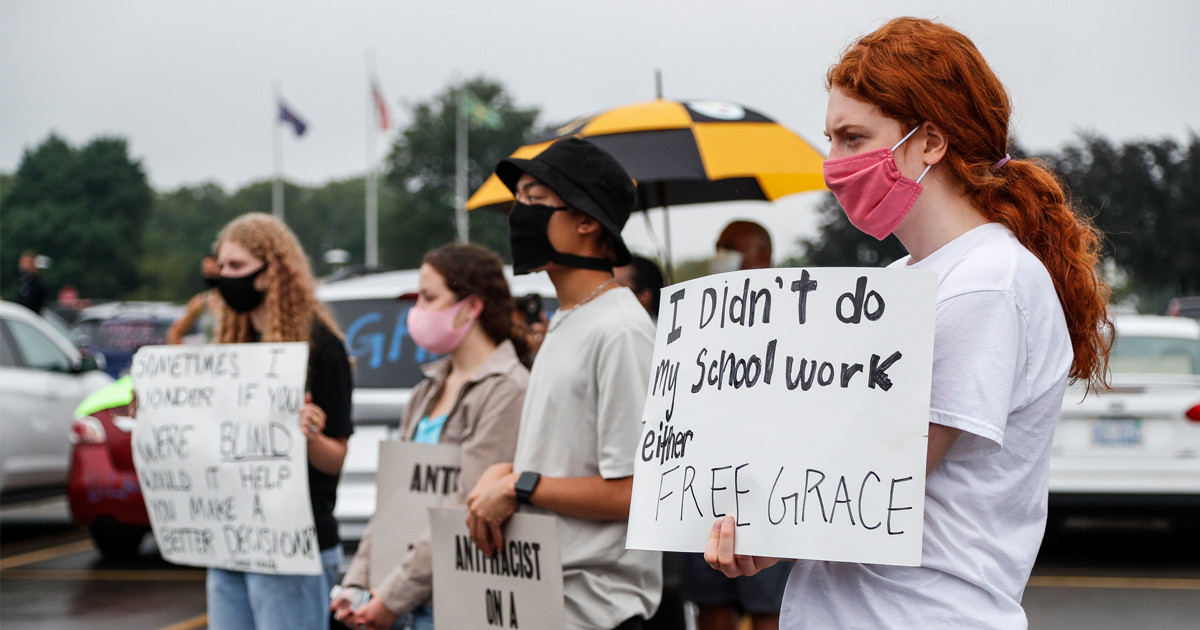
 www.propublica.org
www.propublica.org
.
The Michigan Supreme Court Is Reviewing the Case of a Teenager Incarcerated After Not Doing Online Schoolwork During the Pandemic
Attorneys for a 15-year-old sent to juvenile detention for not doing her schoolwork argued the teenager is not a threat to the community, contrary to a judge’s ruling. Now Michigan’s Supreme Court is stepping in.

Protesters at the #FreeGrace rally and car caravan on Thursday
in Pontiac, Michigan. (Junfu Han/Detroit Free Press)
by Jodi S. Cohen,
ProPublica, and
Nisa Khan,
Detroit Free Press
July 16, 2020
The Michigan Supreme Court said Thursday it is reviewing the circumstances of a case involving a 15-year-old girl who has been in detention since mid-May after a judge determined she violated her probation by not doing her online schoolwork during the pandemic.
That news came the same day attorneys for the teenager filed a motion in court seeking an emergency review and reconsideration of her case and more than 200 people formed a car caravan to protest on her behalf outside the Oakland County Courthouse.
In a statement, the state Supreme Court’s communications director, John Nevin, said, “The State Court Administrative Office is working with the Oakland Circuit Court to examine the processes in this case.”
The case, which has drawn national scrutiny, was detailed in a ProPublica Illinois investigation co-published Tuesday with the Detroit Free Press and Bridge Magazine.
The girl, Grace*, was a high school sophomore in Birmingham Public Schools when she was charged with assault and theft last year. She was placed on probation in mid-April and, among other requirements, was to complete her schoolwork. Grace, who has ADHD and receives special education services, struggled with the transition to online learning and fell behind.
Oakland County Judge Mary Ellen Brennan, the presiding judge of the Family Division, found Grace had violated probation by not completing her schoolwork and ordered her to detention. She concluded Grace was a “threat to (the) community” based on the prior charges of assault and theft.
Grace was detained beginning May 14, when the state was operating under an order from Gov. Gretchen Whitmer to eliminate any form of detention or residential placement unless a young person posed a “substantial and immediate safety risk to others.”
In the court filing Thursday, one of Grace’s attorneys, Jonathan Biernat, wrote that the decision to detain the teenager was contrary to that order because she was “detained based on incomplete schoolwork, which hardly presents a risk of harm to either the community,” or herself.
“The record is entirely devoid of facts to support the actual threat of harm presented by (Grace),” Biernat wrote in the motion.
The motion states that Grace has had “no issues” during the more than two months she has been at the Children’s Village detention center in suburban Detroit, first in secure detention for three weeks and then in a residential treatment program. She “has been an exemplary participant and has completed any and all tasks assigned to her in the time allowed.”
In a statement, the Oakland County court’s Family Division pushed back on criticism of Brennan, saying judges base their decisions on an “extensive review” of information, including public and non-public documents. The court said Grace’s assault and theft charges were “two of many factors” leading to her placement at Children’s Village.
“By definition, any public report is incomplete, out of context, and unfair to all concerned,” according to the statement. “Family court judges have one criterion that must be followed — to make decisions that are in the best interest of the child and the family. This decision is not influenced by race, by income, by ethnicity, or any other variable.”
The ProPublica Illinois investigation did not rely solely on the publicly available court records, and it reported a history of conflict between the mother and daughter, including the mother calling police to the residence on several occasions. There has been no police contact with the family since the November incidents, records show.
The violation of probation involved only incomplete schoolwork and failure to get up for school, and both the mother and daughter have pleaded with the judge to allow them to be together at home. The judge, in announcing her decision in June to keep Grace at Children’s Village, said she thought the teenager was best served by getting treatment and other services that would set her and her mother on a better path forward.
“If this child was such a substantial risk to herself, to others or to the community, that would have been placed on the record and made part of the court file,” Biernat said in response to the court statement.
“The suggestion that (Grace) is so dangerous she needs to be detained and separated from her mother for … months is not supported by the evidence available. If there is additional information that has not been disclosed, I look forward to reviewing that documentation,” Biernat added.
A group representing family law attorneys came to Brennan’s defense. They said the judge, who has been on the bench for 12 years, is a “compassionate, fair, thoughtful, and deliberate judge with an excellent judicial demeanor.”
About 200 people turned out for a car caravan to protest the girl’s detention that traveled from Groves High School, which she attended, to the courthouse. Some made signs — “Black Lives Matter” and “Free Grace” — and taped them on their windows. Grace is African-American.
Amber Abboud, a graduate of Groves High School, said many alumni have shown support for Grace on social media.
“I came out because there is a clear injustice at hand here. I think a lot of these people who attend these schools, we know there is a racial disparity but we don’t talk about it,” she said.
From January 2016 through June 2020, about 4,800 juvenile cases were referred to the Oakland County court. Of those, 42% involved Black youth even though only about 15% of the county’s youth are Black, according to a ProPublica Illinois analysis of county data.
Beverly Hills resident Joyce Peralta, who has a daughter with ADHD, spoke about the racial disparities and difficulties for children with learning disabilities.
“This intersects implicit bias because this would not be happening to a white Birmingham girl who had a little bit of a spat with her mom. That’s what teenage girls do,” she said. “And it intersects both the racial disparities, it intersects how we don’t have services for ADHD kids.”
On Thursday afternoon, at a special meeting of the Birmingham Public Schools Board of Education, board members unanimously approved a resolution asking the court to review Grace’s case and apply “restorative justice practices in the best interest of this student.” The district had pledged to be flexible with school requirements during the school shutdown. Work was graded on a credit/no-credit system.
“No harm should come to (Birmingham Public Schools) students as a result of the sudden shift to online learning caused by the COVID-19 global pandemic,” according to the resolution. State and federal elected officials, the ACLU of Michigan and others also have called for Grace’s release from detention.
School board member Adrienne Young, who works in the State Appellate Defender Office, said board members have received about 300 emails from across the country about the case. She thanked supporters for “standing up for Grace” and apologized to Grace and her family.
*ProPublica is using middle names for the teenager and her mother to protect their identities.

The Michigan Supreme Court Is Reviewing the Case of a Teenager Incarcerated After Not Doing Online Schoolwork During the Pandemic
Attorneys for a 15-year-old sent to juvenile detention for not doing her schoolwork argued the teenager is not a threat to the community, contrary to a judge’s ruling. Now Michigan’s Supreme Court is stepping in.
.




